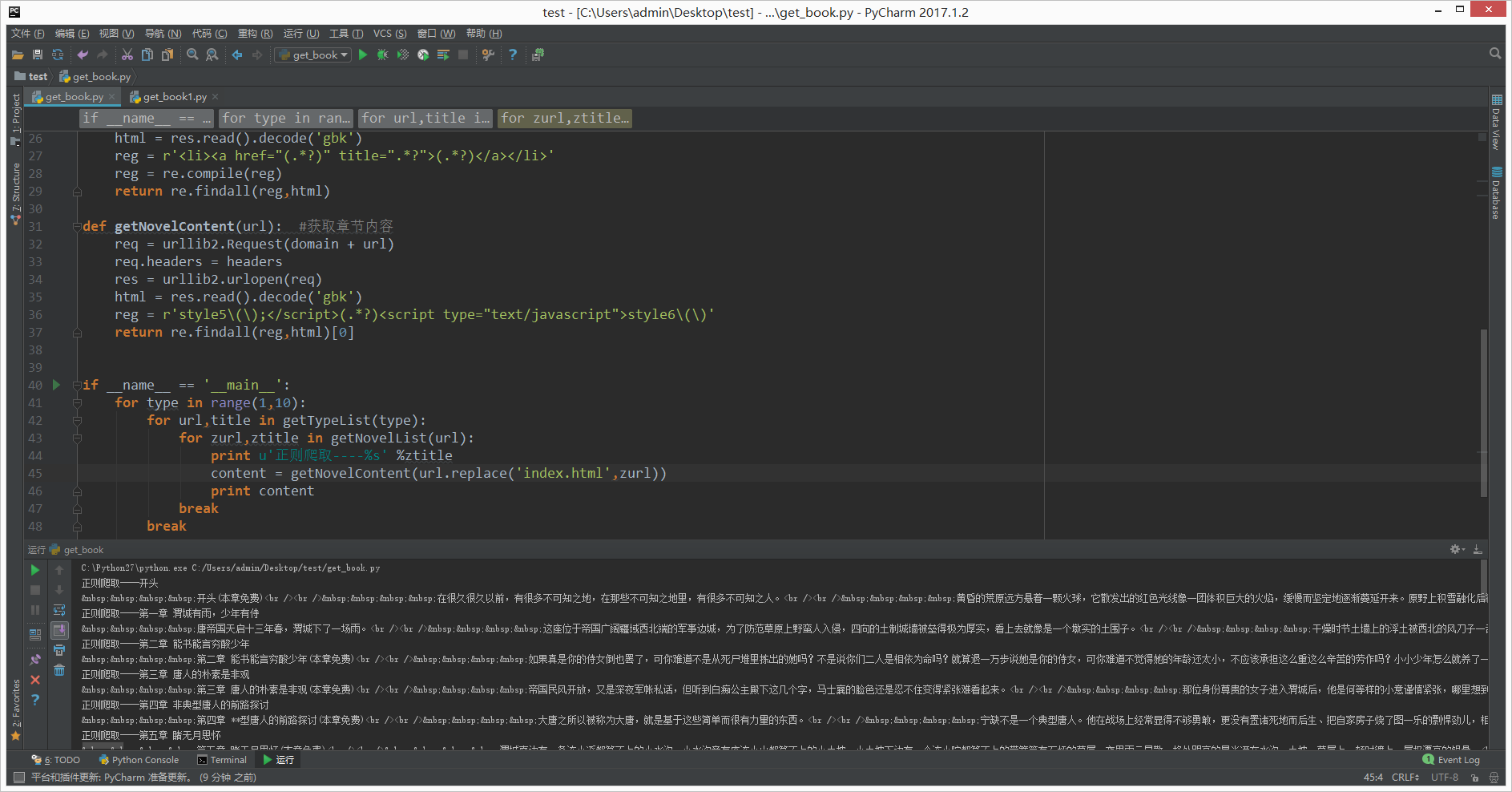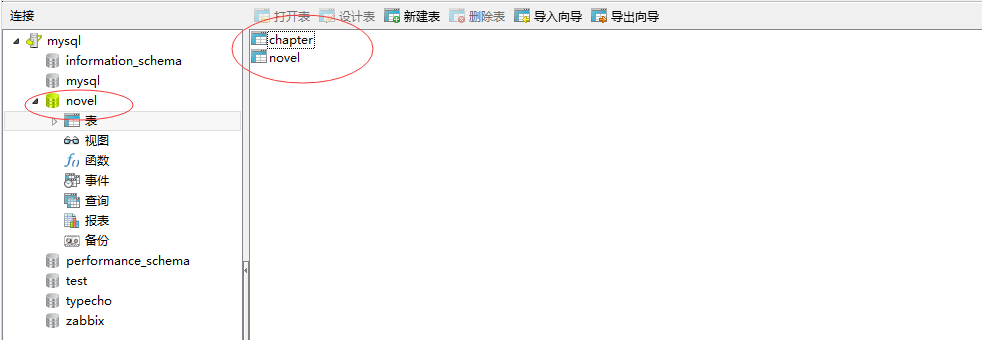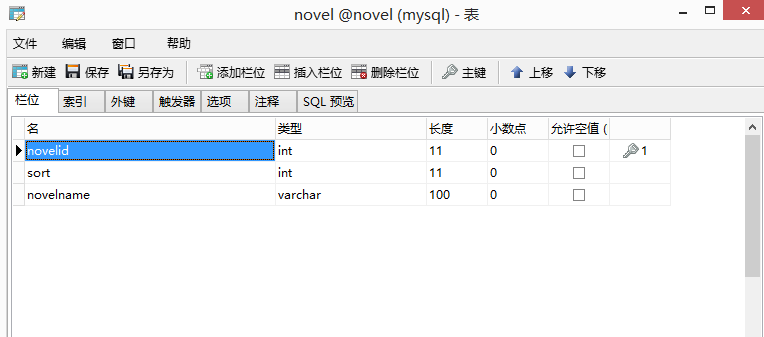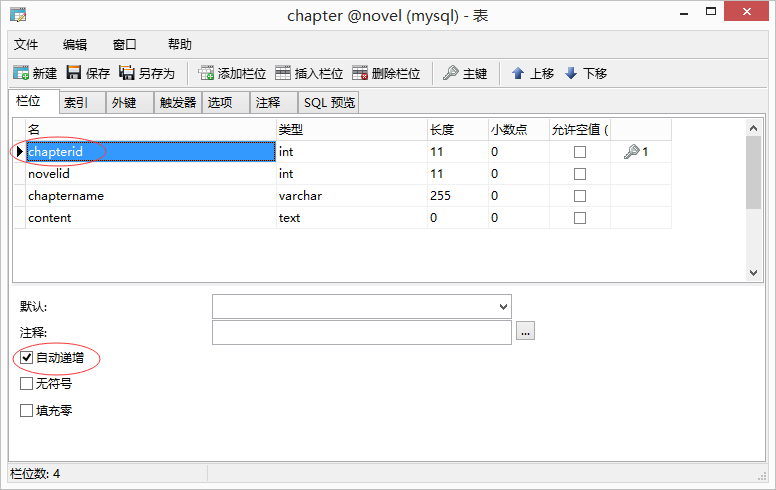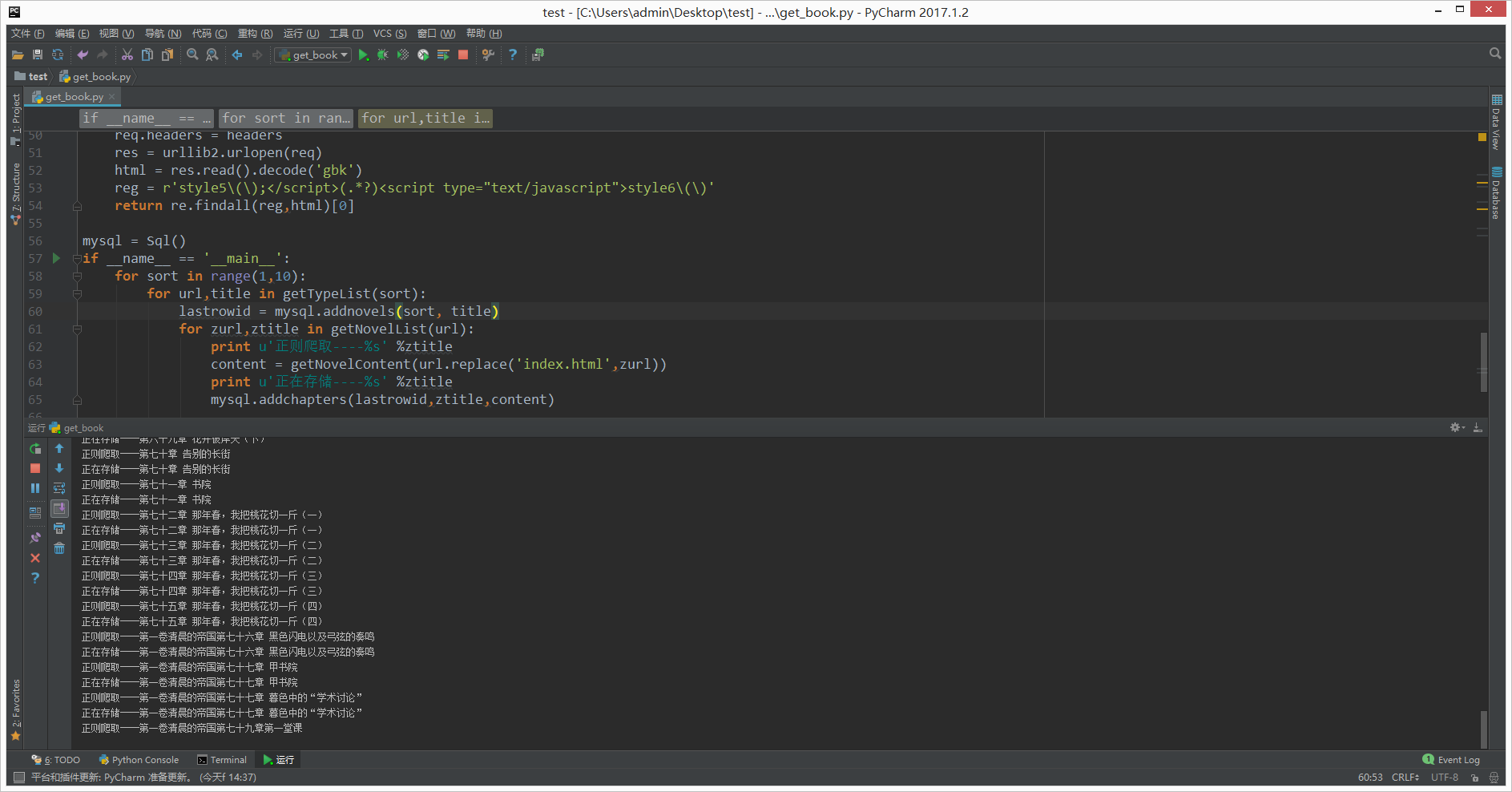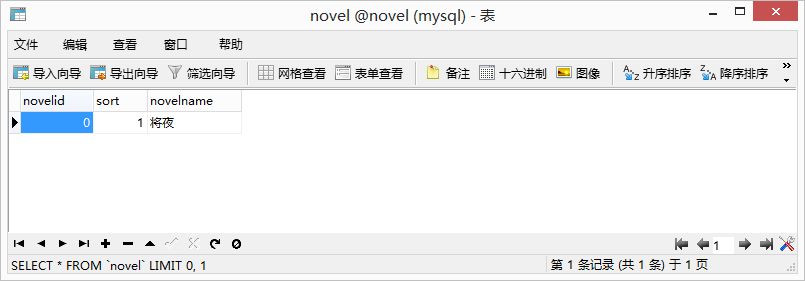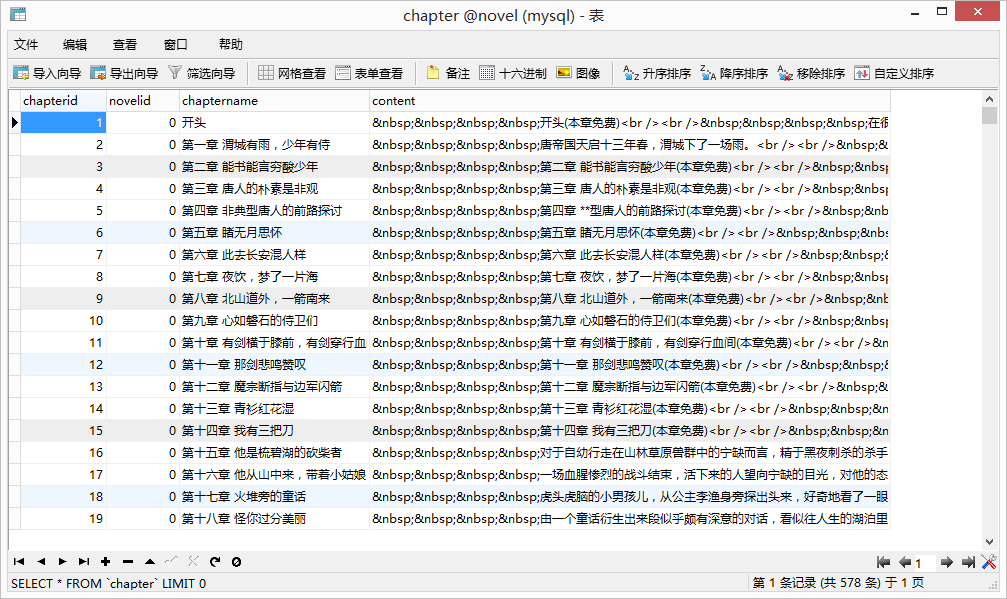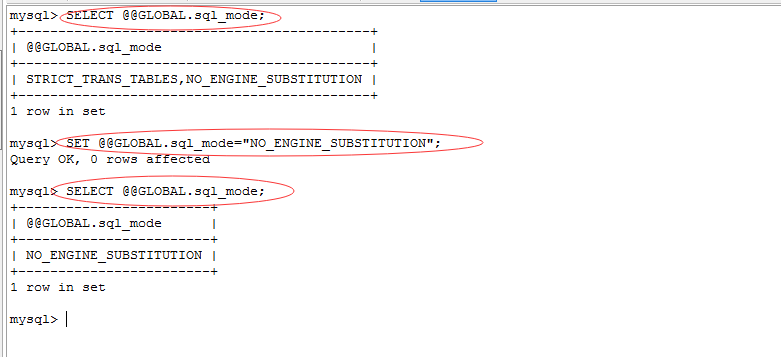Python爬虫:爬取小说并存储到数据库
Posted
tags:
篇首语:本文由小常识网(cha138.com)小编为大家整理,主要介绍了Python爬虫:爬取小说并存储到数据库相关的知识,希望对你有一定的参考价值。
爬取小说网站的小说,并保存到数据库
第一步:先获取小说内容
#!/usr/bin/python
# -*- coding: UTF-8 -*-
import urllib2,re
domain = ‘http://www.quanshu.net‘
headers = {
"User-Agent": "Mozilla/5.0 (Windows NT 6.3; Win64; x64) AppleWebKit/537.36 (KHTML, like Gecko) Chrome/58.0.3029.110 Safari/537.36"
}
def getTypeList(pn=1): #获取分类列表的函数
req = urllib2.Request(‘http://www.quanshu.net/map/%s.html‘ % pn) #实例将要请求的对象
req.headers = headers #替换所有头信息
#req.add_header() #添加单个头信息
res = urllib2.urlopen(req) #开始请求
html = res.read().decode(‘gbk‘) #decode解码,解码成Unicode
reg = r‘<a href="(/book/.*?)" target="_blank">(.*?)</a>‘
reg = re.compile(reg) #增加匹配效率 正则匹配返回的类型为List
return re.findall(reg,html)
def getNovelList(url): #获取章节列表函数
req = urllib2.Request(domain + url)
req.headers = headers
res = urllib2.urlopen(req)
html = res.read().decode(‘gbk‘)
reg = r‘<li><a href="(.*?)" title=".*?">(.*?)</a></li>‘
reg = re.compile(reg)
return re.findall(reg,html)
def getNovelContent(url): #获取章节内容
req = urllib2.Request(domain + url)
req.headers = headers
res = urllib2.urlopen(req)
html = res.read().decode(‘gbk‘)
reg = r‘style5\(\);</script>(.*?)<script type="text/javascript">style6\(\)‘
return re.findall(reg,html)[0]
if __name__ == ‘__main__‘:
for type in range(1,10):
for url,title in getTypeList(type):
for zurl,ztitle in getNovelList(url):
print u‘正则爬取----%s‘ %ztitle
content = getNovelContent(url.replace(‘index.html‘,zurl))
print content
break
break执行后结果如下:
第二步:存储到数据库
1、设计数据库
1.1 新建库:novel
1.2 设计表:novel
1.3 设计表:chapter
并设置外键
2、编写脚本
#!/usr/bin/python
# -*- coding: UTF-8 -*-
import urllib2,re
import MySQLdb
class Sql(object):
conn = MySQLdb.connect(host=‘192.168.19.213‘,port=3306,user=‘root‘,passwd=‘Admin123‘,db=‘novel‘,charset=‘utf8‘)
def addnovels(self,sort,novelname):
cur = self.conn.cursor()
cur.execute("insert into novel(sort,novelname) values(%s , ‘%s‘)" %(sort,novelname))
lastrowid = cur.lastrowid
cur.close()
self.conn.commit()
return lastrowid
def addchapters(self,novelid,chaptername,content):
cur = self.conn.cursor()
cur.execute("insert into chapter(novelid,chaptername,content) values(%s , ‘%s‘ ,‘%s‘)" %(novelid,chaptername,content))
cur.close()
self.conn.commit()
domain = ‘http://www.quanshu.net‘
headers = {
"User-Agent": "Mozilla/5.0 (Windows NT 6.3; Win64; x64) AppleWebKit/537.36 (KHTML, like Gecko) Chrome/58.0.3029.110 Safari/537.36"
}
def getTypeList(pn=1): #获取分类列表的函数
req = urllib2.Request(‘http://www.quanshu.net/map/%s.html‘ % pn) #实例将要请求的对象
req.headers = headers #替换所有头信息
#req.add_header() #添加单个头信息
res = urllib2.urlopen(req) #开始请求
html = res.read().decode(‘gbk‘) #decode解码,解码成Unicode
reg = r‘<a href="(/book/.*?)" target="_blank">(.*?)</a>‘
reg = re.compile(reg) #增加匹配效率 正则匹配返回的类型为List
return re.findall(reg,html)
def getNovelList(url): #获取章节列表函数
req = urllib2.Request(domain + url)
req.headers = headers
res = urllib2.urlopen(req)
html = res.read().decode(‘gbk‘)
reg = r‘<li><a href="(.*?)" title=".*?">(.*?)</a></li>‘
reg = re.compile(reg)
return re.findall(reg,html)
def getNovelContent(url): #获取章节内容
req = urllib2.Request(domain + url)
req.headers = headers
res = urllib2.urlopen(req)
html = res.read().decode(‘gbk‘)
reg = r‘style5\(\);</script>(.*?)<script type="text/javascript">style6\(\)‘
return re.findall(reg,html)[0]
mysql = Sql()
if __name__ == ‘__main__‘:
for sort in range(1,10):
for url,title in getTypeList(sort):
lastrowid = mysql.addnovels(sort, title)
for zurl,ztitle in getNovelList(url):
print u‘正则爬取----%s‘ %ztitle
content = getNovelContent(url.replace(‘index.html‘,zurl))
print u‘正在存储----%s‘ %ztitle
mysql.addchapters(lastrowid,ztitle,content)3、执行脚本
4、查看数据库
可以看到已经存储成功了。
报错:
_mysql_exceptions.OperationalError: (1364, "Field ‘novelid‘ doesn‘t have a default value")
解决:执行sql语句
SELECT @@GLOBAL.sql_mode;
SET @@GLOBAL.sql_mode="NO_ENGINE_SUBSTITUTION";
报错参考:http://blog.sina.com.cn/s/blog_6d2b3e4901011j9w.html
本文出自 “M四月天” 博客,请务必保留此出处http://msiyuetian.blog.51cto.com/8637744/1931102
以上是关于Python爬虫:爬取小说并存储到数据库的主要内容,如果未能解决你的问题,请参考以下文章
